

Belief in God Can Improve Mental Health Outcomes. By Rick Nauert PhD Senior News Editor Reviewed by John M.
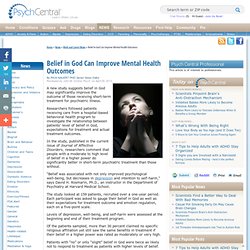
Grohol, Psy.D. on April 26, 2013 A new study suggests belief in God may significantly improve the outcome of those receiving short-term treatment for psychiatric illness. Researchers followed patients receiving care from a hospital-based behavioral health program to investigate the relationship between patients’ level of belief in God, expectations for treatment and actual treatment outcomes. In the study, published in the current issue of Journal of Affective Disorders, researchers comment that people with a moderate to high level of belief in a higher power do significantly better in short-term psychiatric treatment than those without. “Belief was associated with not only improved psychological well-being, but decreases in depression and intention to self-harm,” says David H.
The study looked at 159 patients, recruited over a one-year period. Source: McLean Hospital. CBT is better than nothing for older adults with depression, but so is any form of active support. Depression is such a widely known issue now that it barely needs introduction.
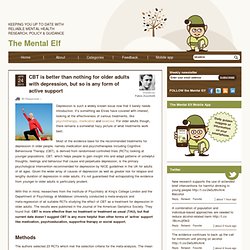
It’s something we Elves have covered with interest, looking at the effectiveness of various treatments, like psychotherapy, medication and exercise. For older adults though, there remains a somewhat hazy picture of what treatments work best. Most of the evidence base for the recommended treatments for depression in older people, namely medication and psychotherapies including Cognitive Behavioural Therapy (CBT), is derived from randomised controlled trials (RCTs) looking at younger populations.
CBT, which helps people to gain insight into and adapt patterns of unhelpful thoughts, feelings and behaviour that cause and perpetuate depression, is the primary psychological intervention recommended for depression by NICE guidelines in the UK for adults of all ages. Methods. Healing from Emotional Eating. Emotional eating seems to be almost a loaded phrase in our society today.
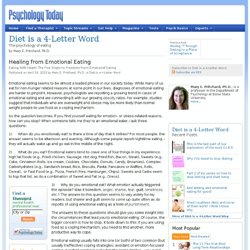
A practical guide to social media in mental health practice. DBT Skill for Pain Relief. So many treatments for major depression to choose from. How does individual interpersonal psychotherapy compare to the rest? Talking therapies for mental disorders are an ever-expanding field, with variations in treatments appearing all the time.
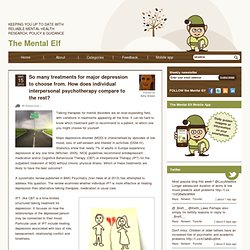
It can be hard to know which treatment path to recommend to a patient, or which one you might choose for yourself. Major depressive disorder (MDD) is characterised by episodes of low mood, loss of self-esteem and interest in activities (DSM-IV). Statistics show that nearly 7% of adults in Europe experience depression at any one time (Witchen, 2005). NICE guidelines recommend antidepressant medication and/or Cognitive Behavioural Therapy (CBT) or Interpersonal Therapy (IPT) for the outpatient treatment of MDD without chronic physical illness. Which of these treatments are likely to have the best outcome? A systematic review published in BMC Psychiatry (Van Hees et al 2013) has attempted to address this question. Interpersonal Therapy is often recommended as a treatment for depression associated with relationship conflict and loneliness. Books for the blues. The Arts Council-funded project to promote self-help books for mental health conditions was widely reported in the media last week.
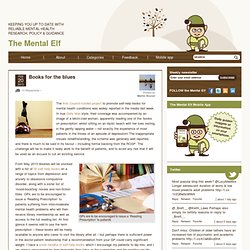
In true Daily Mail style, their coverage was accompanied by an image of a bikini-clad woman, apparently reading one of the ‘books on prescription’ whilst sitting on an idyllic beach with her toes resting in the gently lapping water – not exactly the experience of most patients in the throes of an episode of depression! The inappropriate visuals notwithstanding, the scheme was generally well reported, and there is much to be said in its favour – including formal backing from the RCGP.
Can Eye Movements Treat Trauma? Imagine you are trying to put a traumatic event behind you.
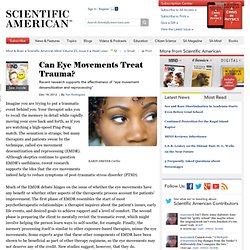
Your therapist asks you to recall the memory in detail while rapidly moving your eyes back and forth, as if you are watching a high-speed Ping-Pong match. The sensation is strange, but many therapists and patients swear by the technique, called eye movement desensitization and reprocessing (EMDR). Although skeptics continue to question EMDR's usefulness, recent research supports the idea that the eye movements indeed help to reduce symptoms of post-traumatic stress disorder (PTSD). Much of the EMDR debate hinges on the issue of whether the eye movements have any benefit or whether other aspects of the therapeutic process account for patients' improvement.
Troubled Souls: Spirituality as a Mental Health Hazard. The relationship between spirituality and/or religion and mental and physical health has increasingly come under study in recent years. It almost seems to have become conventional wisdom that spirituality is associated with better health, mental and physical. However, a recently published British study found that people who consider themselves spiritual but not religious are more likely to have a mental disorder compared to conventionally religious people and to those who are neither religious nor spiritual.
Conventionally religious people and those who were neither religious nor spiritual did not differ in their mental health status, suggesting that being religious offers few advantages in terms of mental health. How Our Insecurities Can Reveal Our Deepest Gifts. In my decades of practice as a psychotherapist, this is the insight that has inspired me most: Our deepest wounds surround our greatest gifts.
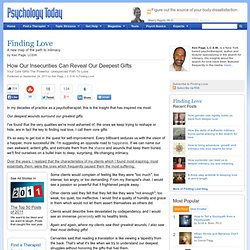
How to Discover Our Core Gifts Within Our Wounds. Five Ways to Boost Your Natural Happy Chemicals. You can stimulate more happy chemicals with fewer side effects when you understand the job your happy chemicals evolved to do.
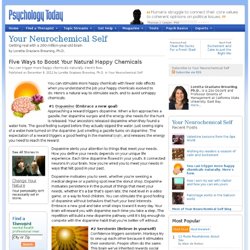
Here's a natural way to stimulate each, and to avoid unhappy chemicals. {*style:<b>#1 Dopamine (Embrace a new goal) </b>*}Approaching a reward triggers dopamine. When a lion approaches a gazelle, her dopamine surges and the energy she needs for the hunt is released. Introverts Are Not Failed Extroverts. I wanted to cheer when Sophia Dembling, a PT blogger, made these comments about introverts : Having been told all our lives that our way is not the right way…
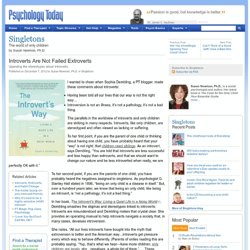
What storytelling does to our brainsThe Buffer blog: productivity, life hacks, writing, user experience, customer happiness and business. 11.6K Flares Filament.io 11.6K Flares × In 1748, the British politician and aristocrat John Montagu, the 4th Earl of Sandwich used a lot of his free time for playing cards.
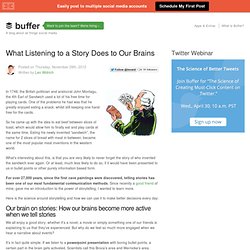
One of the problems he had was that he greatly enjoyed eating a snack, whilst still keeping one hand free for the cards. So he came up with the idea to eat beef between slices of toast, which would allow him to finally eat and play cards at the same time. Eating his newly invented “sandwich”, the name for 2 slices of bread with meat in between, became one of the most popular meal inventions in the western world. The Science of Storytelling: Why Telling a Story is the Most Powerful Way to Activate Our Brains. Fear Fades in the Face of Acceptance. We all feel fear . How We Disproved Freud's Idea of Irrational Fear. Why Is It So Hard To Get Anyone To Change? Fear can be erased from the brain before its memory has been formed. Eye Contact Quells Online Hostility. Are All Psychotherapies Created Equal? Many Shades of Grey: Reclaiming ‘Humanistic’ Sex Therapy.
Therapist Counselor Psychologist. Turning Trauma Into Story: the Benefits of Journaling. Self help: try positive action, not positive thinking. For years self-help gurus have preached the same simple mantra: if you want to improve your life then you need to change how you think. Force yourself to have positive thoughts and you will become happier. Visualise your dream self and you will enjoy increased success. Big Five personality traits. In psychology, the Big Five personality traits are five broad domains or dimensions of personality that are used to describe human personality. The theory based on the Big Five factors is called the five-factor model (FFM).[1] The five factors are openness, conscientiousness, extraversion, agreeableness, and neuroticism.
The Placebo Effect. Career Counseling. Counseling.